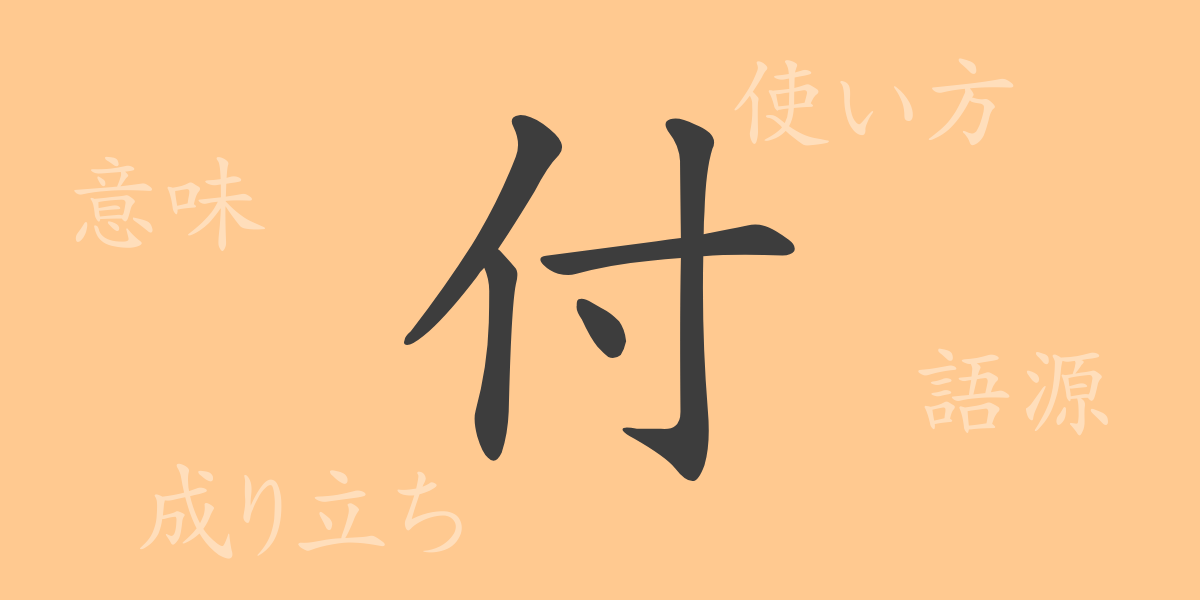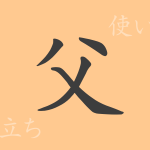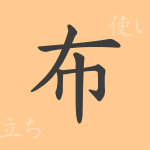In the rich tapestry of the Japanese language, kanji (漢字) play a crucial role in expanding the world of meaning. One of the 常用漢字 (じょうようかんじ, commonly used kanji), “付” (ふ, fu), holds diverse uses and a deep history, firmly rooted in the daily lives of the Japanese people. This article delves into the origins of “付” (ふ, fu), its meanings and uses, and even the idioms and proverbs it forms, unraveling the full scope of this kanji.
The Origin of 付 (ふ, fu)
The kanji “付” (ふ, fu) traces its roots back to ancient Chinese oracle bone script. Originally, it symbolized a figure holding something in their hand. Over time, it evolved to carry meanings such as “to approach” and “to attach.” This kanji is used in various contexts, signifying not only physical contact but also abstract concepts.
Meanings and Uses of 付 (ふ, fu)
The kanji “付” (ふ, fu) fundamentally means “to attach,” “to affix,” or “to accompany.” These meanings convey a state of something or someone approaching or sticking to something. Additionally, it is used to signify “related to” or “involved with.” Common usages include verbs and nouns like “付ける” (つける, tsukeru), “付き合う” (つきあう, tsukiau), and “付属する” (ふぞくする, fuzoku suru).
Readings, Stroke Count, and Radical of 付 (ふ, fu)
Despite its simple structure, the kanji “付” (ふ, fu) is known for its diverse readings and meanings.
- Readings: On’yomi (音読み, Chinese reading) is “フ” (ふ, fu), and Kun’yomi (訓読み, Japanese reading) includes “つ・ける” (つける, tsukeru) and “つ・く” (つく, tsuku).
- Stroke Count: A total of 5 strokes.
- Radical: The radical is 人偏 (ひとえ, hitoe).
Idioms, Proverbs, and Phrases Using 付 (ふ, fu)
Japanese is rich with idioms, proverbs, and phrases that include “付” (ふ, fu). For instance, “付和雷同” (ふわらいどう, fuwa raidou) means to conform to others’ opinions, and “一心不乱” (いっしんふらん, isshin furan) describes a state of complete concentration where one’s mind is not attached to anything else. Additionally, idiomatic expressions like “目に付く” (めにつく, me ni tsuku) meaning “to catch one’s eye” and “手に付かない” (てにつかない, te ni tsukanai) meaning “unable to concentrate” are commonly used in daily conversations.
Summary of 付 (ふ, fu)
The kanji “付” (ふ, fu) boasts a wide range of uses and the power to enrich language. Though often used unconsciously in daily life, it carries a long history and cultural significance. Through this article, you have gained a deeper understanding of the multifaceted nature of “付” (ふ, fu) and enhanced your knowledge of the Japanese language. By paying attention to words and expressions that include “付” (ふ, fu) going forward, you may discover new insights.

























